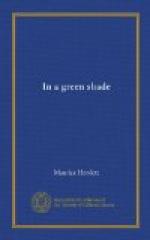Gehazi the leper is in cheese when it is white and dry; Lot’s wife when it is too salt; Argus’s eyes are obvious:
Tom Piper hath hoven and puffed up cheeks;
poor Cobler is there when it is leathery; Esau betrays himself by hairs, Maudlin by weeping; and as for the “Bishop that burneth” the explanation is complicated. It seems that Cicely would run after the bishop for his blessing, and leave the milk on the fire to burn.[A] For all these ill-timed guests you are to baste Cicely, or “tug her a crash,” or “make her seek creeks”; you “call her a slut,” or “dress her down.” But you encourage her at the end with this quatrain:
“If thou, so oft beaten,
Amendest by this,
I will no more threaten,
I promise thee, Cis.”
[Footnote A: A correspondent from Yorkshire gives me a better explanation. In that county burnt milk is still said to be “bishoped.” The bishop’s power of the keys is thought to be hinted.]
Fizgig, too, which is his lively name for the kitchen knave, gets the holly-wand across his quarters when he deserves it; but Tusser seems to feel that discipline may be overdone. It may be waste of good stick and good pains, for:
As rod little mendeth where manners be
spilt,
So naught will be naught, say and do what
thou wilt;
and he is careful to remind you in concluding his chapter of Huswifely Admonitions that you had always better smile than scold:
Much brawling with servant, what man can
abide?
Pay home when thou fightest, but love
not to chide.
The whole matter of servants is amusing or rueful study nowadays, accordingly as one looks at servants. Their treatment under Tusser’s handling brings the husbandman poet very near to Hesiod, in whose time servitude was not called by any other name. Tusser’s huswife, warned by the matin cock, called up her maids and men at four in the summer, at five in the winter. She packed them off to bed at ten or nine at night, according to the season, and, it would appear, to bed in the dark. She made her own candles, and feared also a fire, which will account for that. There was no early tea for Mistress Tusser’s maids, let me tell you:
Some slovens from sleeping no sooner get
up
But hand is in aumbry and nose is in cup.
Nothing of the kind with Mrs. Tusser. On the other hand, hard work all round: “Sluts’ corner” to be ridded; sweeping, dusting, mop-twirling,
Let some to peel hemp, or else rushes
to twine,
To spin or to card, to seething of brine;
and as for the men:
Let some about cattle, some pastures to
view,
Some malt to be grinding against ye do
brew.
And so to breakfast. The morning star was the signal for it; and a hasty meal was expected of you:
Call servants to breakfast, by day-star
appear,
A snatch, and to work—fellows
tarry not here.




